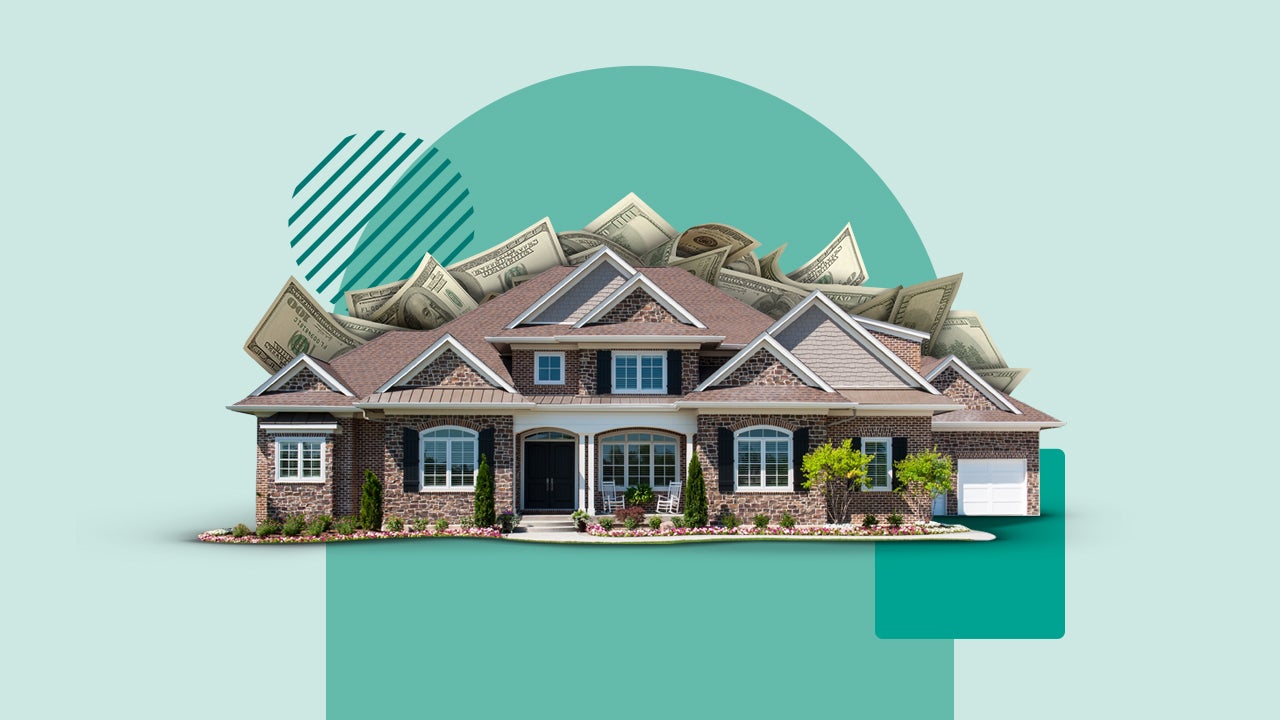How a home builds generational wealth: home equity and your family’s future

Key takeaways
- Buying and owning a home can lay the foundations of generational wealth.
- Home equity can increase substantially over time as you pay down your mortgage and your property’s value appreciates.
- Different ways to pass down property include wills, trusts, joint ownership and transfer-on-death deeds.
My mother never had substantial savings, investments or anything of value other than her house. It was her wish to pass on her only significant asset to her three kids: me, my brother and my sister. And when she died, she made it happen: we inherited her home. And with that, she laid a foundation for generational wealth.
Just about every parent wants the ability to bequeath something to their children that will enrich them. For many families, the legacy often begins with homeownership.
“Real estate is usually one of the largest assets the average person will own,” says Maxine Teele, a Bronx, NY-based licensed real estate agent with Keller Williams Realty. “And such a large asset appreciating over time typically results in huge profits, which, if used correctly, can positively impact the next generation’s wealth.”
In other words, your residence can be a key financial resource for your family. Buying and maintaining a home builds an equity (ownership) stake you can pass down to your heirs. It’s especially significant nowadays, when record-high home prices and elevated mortgage rates can make homeownership feel like an elusive dream.
Here’s why and how home equity can become the cornerstone of your family’s generational wealth.
Why is home equity important?
Home equity is the portion of your property that you actually own outright. It represents the residence’s current market value minus any outstanding mortgage debt.
When you borrow to buy a home, your initial equity stake equals your down payment — the amount of money you directly contributed towards the purchase, instead of financing. Over time, your home equity increases in two primary ways: by a decrease in the mortgage debt, and by a rise in the property’s value.
“Your equity grows as you make mortgage payments, thereby reducing the mortgage balance, and as your home’s market value climbs due to factors like home improvements made or neighborhood enhancements as well as overall real estate market trends,” explains Matt Dunbar, senior vice president of the southeast region for Churchill Mortgage. “Your equity slice of homeownership is crucial, as it’s not just a theoretical figure – it translates into real financial potential, an asset that can be borrowed against or sold for profit.”
You can tap home equity in various ways — in the form of a home equity loan, home equity line of credit, or cash-out refinance of your primary mortgage — often at better interest rates than personal loans. Your equity can also net you a tidy profit when it’s time to sell your home.
Home equity “is often the primary source of wealth for many homeowners,” Dunbar adds. And for their descendants — if the property (or proceeds from the property) remain in the homeowner’s estate.
- Housing is where America’s wealth is stored: The U.S. housing market was worth $49.7 trillion in 2024, an increase of $2.5 trillion over the last year, according to real estate brokerage Redfin.
- According to the Federal Reserve, American homeowners collectively possess nearly $35 trillion in home equity as of Q4 2024.
- 82% of U.S. adults characterize owning a home as part of the “American Dream,” according to Bankrate’s 2025 Home Affordability Report .
- Americans need an annual income of nearly $117,000 to afford a median-priced, home today, according to Bankrate’s April 2025 Home Affordability Study.
- Buying a significant asset like a home was the second-largest motivator for people to make an estate plan, according to Caring.com’s 2025 Wills Estate Planning Study.
- 68% of investors have real estate they plan to leave to their heirs, according to a 2022 Money & Family Ameriprise study.
How can buying a house help you build wealth?
Generational wealth refers to assets that are passed down from one generation of a family to the next. It can take any form: financial investments, savings accounts, tangible goods — and real estate.
“It’s possible to build generational wealth via home equity largely because it requires only two actions,” says Robert Johnson, a professor of finance at Heider College of Business, Creighton University. “First, the homeowner must make regular mortgage payments, thereby lowering their mortgage balance, and the homeowner must resist the temptation to borrow against the accumulated home equity if possible.”
Of course, tapping into your ownership stake to make home repairs or renovations is often a responsible and recommended strategy. While outstanding home equity loans or HELOCs do deplete your equity in the short term, they can ultimately increase it if they go towards value-enhancing improvements. Just be aware that, “if you use the equity in your property to renovate to your liking, that is not an automatic translation to increasing the value of your property,” warns Teele. “That does not always translate to more dollars when you sell.”
The gradual way in which home equity accrues makes it an ideal long-term wealth-building vehicle. “A monthly mortgage payment is often considered a forced savings account,” as National Association of Realtors (NAR) Chief Economist Lawrence Yun once characterized it. Plus, property tends to appreciate over time. While housing markets do have their ups and downs, “it’s very rare to see real estate go to zero in value,” says Steven Orlowkski, certified financial planner and founder/CEO of Orlowski Financial, a New Jersey-based financial services firm.
“Real estate is one of the best ways to build generational wealth simply because, unless you really do something just unimaginably foolish, you’re going to have residual value,” he adds. “If you do it right, you invest in the right areas, and you try to get into growth locations, then you will be able to have a tangible asset that you can pass on to successive generations.”
How might owning a home help younger generations build wealth?
Inheriting a home has several economic benefits, offering a variety of options and giving a valuable head start to younger generations, especially nowadays when house-buying is becoming increasingly expensive — a six-figure-income proposition, as Bankrate’s Housing Affordability Study found.
Not surprisingly, 83 percent of U.S. adults who don’t own a home but want to cite affordability as the reason holding them back, according to Bankrate’s most recent Home Affordability Survey. Not having enough income (59 percent), home prices being too high (55 percent) or not being able to afford a down payment and closing costs (46 percent) are the specific factors they cite. Gen Xers (45 to 60-year-olds) are the most likely age group to say too much debt is keeping them from buying a home.
So, bequeathing a home “not only gifts an appreciating asset, but it also shields heirs from the escalating expenses of homeownership in dynamic real estate markets,” says Dunbar.
Passing down home equity can also improve bonds between generations: affection for the old family homestead, and appreciation for the efforts predecessors made to acquire and maintain it.
Building home equity in 2025
Over the past five years, in particular, American homeowners have seen a significant jump in home prices and values, leading to a record rise in home equity.
$34.7 trillion
Source: Board of Governors of the Federal Reserve System (US) via FRED
According to ICE Mortgage Technology, entering 2025, mortgage-holding homeowners had the largest volume of equity of any year on record: a collective $11 trillion in tappable equity (the amount that can be borrowed against while still maintaining a 20 percent homeownership stake). That averages out to $203,000 per homeowner.
“The amount of equity available for withdrawal continues to rise, and while withdrawals remain subdued compared with historical levels, the combination of market trends, including expectations for lower interest rates and competitive HELOC pricing, provides an opportune environment for more withdrawal activity in coming quarters,” says Andy Walden, head of mortgage and housing market research at ICE.
The higher costs of mortgages and homeownership are causing many prospective buyers to wait things out in the hopes that home prices and interest rates come down. However, there’s a risk to postponing a purchase — and not just because the inflated costs may be the new normal.
“It can mean missing out on potential home equity growth,” says Shawn Malkou, managing broker with X2 Mortgage of Chandler, AZ. “Despite current market conditions, homeownership will almost always be a valuable way to build wealth over time. The sooner you can get into the homeownership game, the sooner you’ll be able to start building wealth.”
Dunbar agrees. “Delaying could mean confronting even steeper home prices down the line, consequently stalling the advantages of homeownership and the potential for wealth accumulation that could benefit future generations,” he says.
Though they have regrets, Most American homeowners (70 percent) would buy their current home if they had to do it over again, according to Bankrate’s 2025 Homeowner Regrets Survey. Among those who have regrets, the most common has to do with home maintenance costs being more expensive than expected.
How to pass down property
There are different ways to transfer your home and its equity to your chosen heirs. Here are the most common options.
Challenges of passing down property
Johnson cautions that purchasing residential real estate and building home equity doesn’t necessarily guarantee a foundation for a family fortune. “I believe there are better ways to build generational wealth: specifically, investing in a diversified stock portfolio,” he says.
Certainly, passing down property can be problematic. “Among the primary issues are the potential estate or inheritance taxes incurred based on the property’s valuation,” Dunbar says. That can be true of any asset, of course, but “additionally, unresolved liens or mortgages on the property can further complicate the handover process.” Inheriting a house with a mortgage can especially be burdensome to heirs, if they’re not in a position to assume the debt. “Moreover, older properties might require substantial maintenance or renovations, adding further challenges for the inheritors,” he notes.
Then there’s the problem of liquidity. Home equity wealth can’t easily be shared or divvied up among multiple owners, the way cash or stocks can.
“How do we determine what we want for this property?” asks Kenneth Chavis IV, senior wealth counselor at Versant Capital Management, an Arizona-based wealth management firm. “Maybe one or two of us want to keep it. Maybe one or two of us want to sell it for various reasons. That can lead to some conflicts and challenges. You potentially have to go through a legal process if they can’t agree amicably. “Of course, “A lot of that can be mitigated with proper estate planning.”
Many economists and social historians attribute much of the ongoing racial wealth gap to redlining and the way it effectively left minority families behind in the asset-appreciation sweepstakes.
Redlining’s impact lingers partly because, often, “a home or property may be the only asset that a family [of color] can pass to the next generation,” in contrast to a white family who has “investments, business interests and a whole assortment of other assets,” says Chavis. “The importance is much greater for Black families to own homes and pass it on to the next generation.” Closing the gap involves strengthening fair lending enforcement and expanding access to credit and down payment assistance programs, so more families can get a foothold in homeownership.
Bottom line on home equity and generational wealth
“Real estate is one of the pillars to wealth,” says Teele. “It’s an asset that appreciates over time, and that appreciation is attached to the home and not the owner. So, when the asset – meaning your home – is passed down from one generation to the next, the home equity is now theirs.”
Time is of the essence. “If buying a home stretches a budget to the point of constant financial stress, it might not be the right move,” says Malkou. “However, potential homeowners need to understand that the longer they own a home, the more affordable it will become and the quicker their home equity should grow.”
No investment is perfect, of course: A home’s illiquidity can make it a hassle for inheritance. Still, “the enduring value of real estate and the track record of homes appreciating over time make it a powerful tool for wealth creation,” Dunbar states. “By building equity and leveraging the financial perks of owning property, you can establish a solid foundation for long-term prosperity.”
And in my own case, all has gone smoothly. My sister and two nephews were already living in the home we inherited from our mother, and my brother and I agreed to let that arrangement continue: We don’t have any need or plans to sell the place anytime soon. But for all of us, it’s about more than acquiring a valuable asset – it’s about honoring our legacy from her.
Additional reporting by Erik J. Martin
Why we ask for feedback Your feedback helps us improve our content and services. It takes less than a minute to complete.
Your responses are anonymous and will only be used for improving our website.






